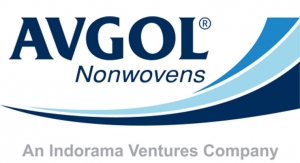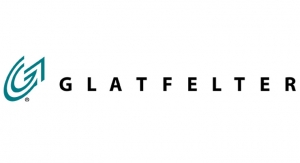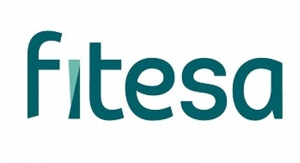08.06.20
Will the definition and importance of sustainability in the disposable hygiene industry change due to COVID-19? This was the question we tackled in the webinar, Safety Versus Sustainability. Can we have both in the time of COVID-19?, led by Nonwovens Industry (NWI) and co-sponsored by H.B. Fuller.
How does the nonwovens industry define sustainability?
Biodegradable, compostable, and environmentally-friendly are just a few of the numerous claims related to sustainability that we observe in the nonwovens industry. Suppliers, manufacturers and brand owners are working to clarify these claims and identify which of them will make the most sense to consumers, especially with the changes related to COVID-19, and which path to sustainability our industry will take.
During the webinar, H.B. Fuller’s director of global new product development, Ameara Mansour, polled nonwoven industry professionals on the following questions:
• What best describes their company’s stand on sustainability efforts in product development?
• What is the main challenge for your company to move sustainable product innovations forward?
• What do they think will be the biggest driver for a wider adoption of sustainable hygiene products by consumers?
• How important various sustainable approaches such as reduction of the carbon footprint, recyclability, biodegradability and composability are for their product development?
View Polling Results
According to the polling results, over 99% of the 140 respondents are focused on sustainable product development at this time. We have observed that 30% of participating manufacturers of hygiene products and 43% of manufacturers of other products using nonwovens are in the ideation stage of the development of products with some sustainable benefit. A clear majority of respondents said they already offer commercial products with some sustainability benefit. While this polling setup didn’t allow for the collection of the exact definition of sustainability from each respondent, 40% of respondents said they are working on addressing biodegradability or composability in their product development.
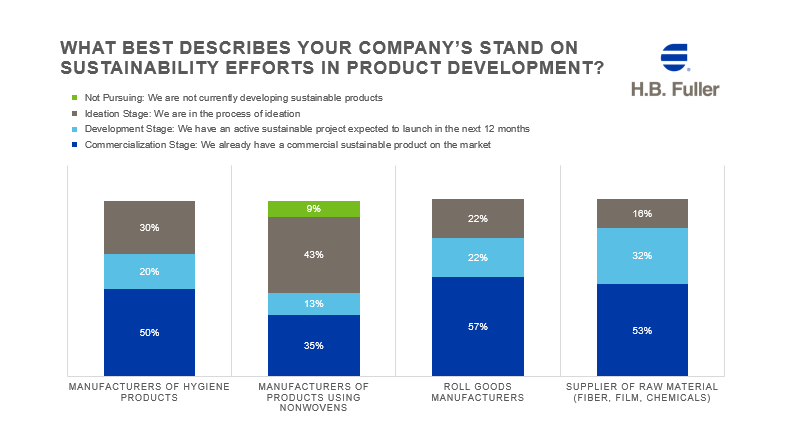
When asked about the key challenge for their company to move sustainable product innovation forward, respondents had mixed answers. The manufacturers of hygiene products identified lack of sustainable substrates as a key barrier, whereas the rolled goods manufacturers and suppliers of raw materials reported the lack of demand certainty as the main challenge. Lack of industry alignment on regulation, eco-label and testing standards also was reported as one of the critical challenges for the nonwovens industry in general.
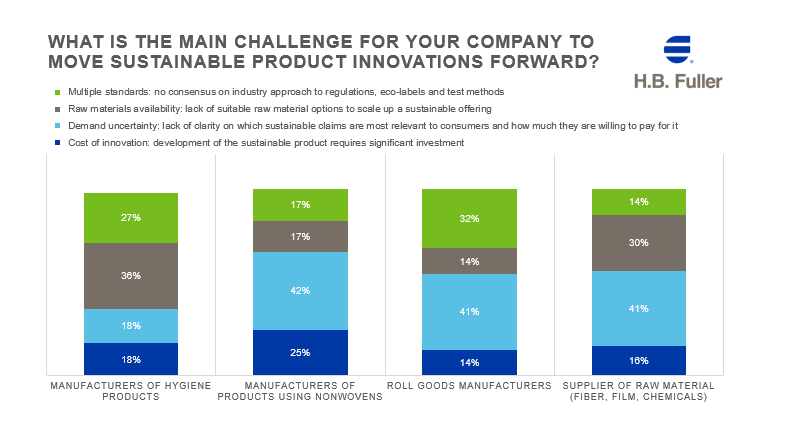
All participating respondent groups agreed that improved affordability and accessibility of greener products is the key factor that will drive popularization of sustainable hygiene articles by consumers. The second most critical factor that could lead to a faster adoption rate of greener hygiene articles is an improved infrastructure, allowing for easier waste separation, collection and processing for consumers.
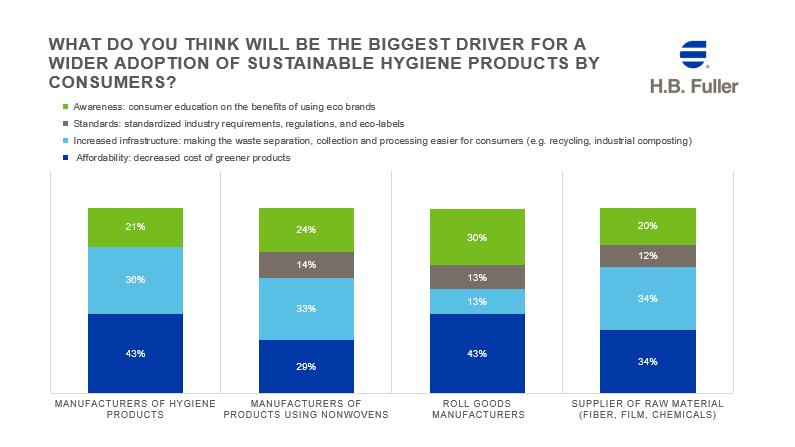
There is no doubt that sustainability remains a focus for suppliers across the nonwovens industry’s value chain, as they are continuing to address it in their product development amidst these ever-changing times. The path to this sustainable future, however, is not straightforward as there is no clear alignment within the nonwovens industry on prioritization of sustainable approaches, standards and consumer education.
At H.B. Fuller, we approach sustainability from multiple viewpoints. We also partner with the manufacturers of sustainable roll goods to help develop holistic solutions for the manufacturers of hygiene articles and increase the speed to market. This is a challenging, yet exciting, time for our industry as we are progressing toward a more sustainable future together. Let us know how we can help you bond your innovative substrates in the most reliable and sustainable way.
How does the nonwovens industry define sustainability?
Biodegradable, compostable, and environmentally-friendly are just a few of the numerous claims related to sustainability that we observe in the nonwovens industry. Suppliers, manufacturers and brand owners are working to clarify these claims and identify which of them will make the most sense to consumers, especially with the changes related to COVID-19, and which path to sustainability our industry will take.
During the webinar, H.B. Fuller’s director of global new product development, Ameara Mansour, polled nonwoven industry professionals on the following questions:
• What best describes their company’s stand on sustainability efforts in product development?
• What is the main challenge for your company to move sustainable product innovations forward?
• What do they think will be the biggest driver for a wider adoption of sustainable hygiene products by consumers?
• How important various sustainable approaches such as reduction of the carbon footprint, recyclability, biodegradability and composability are for their product development?
View Polling Results
According to the polling results, over 99% of the 140 respondents are focused on sustainable product development at this time. We have observed that 30% of participating manufacturers of hygiene products and 43% of manufacturers of other products using nonwovens are in the ideation stage of the development of products with some sustainable benefit. A clear majority of respondents said they already offer commercial products with some sustainability benefit. While this polling setup didn’t allow for the collection of the exact definition of sustainability from each respondent, 40% of respondents said they are working on addressing biodegradability or composability in their product development.

When asked about the key challenge for their company to move sustainable product innovation forward, respondents had mixed answers. The manufacturers of hygiene products identified lack of sustainable substrates as a key barrier, whereas the rolled goods manufacturers and suppliers of raw materials reported the lack of demand certainty as the main challenge. Lack of industry alignment on regulation, eco-label and testing standards also was reported as one of the critical challenges for the nonwovens industry in general.

All participating respondent groups agreed that improved affordability and accessibility of greener products is the key factor that will drive popularization of sustainable hygiene articles by consumers. The second most critical factor that could lead to a faster adoption rate of greener hygiene articles is an improved infrastructure, allowing for easier waste separation, collection and processing for consumers.

There is no doubt that sustainability remains a focus for suppliers across the nonwovens industry’s value chain, as they are continuing to address it in their product development amidst these ever-changing times. The path to this sustainable future, however, is not straightforward as there is no clear alignment within the nonwovens industry on prioritization of sustainable approaches, standards and consumer education.
At H.B. Fuller, we approach sustainability from multiple viewpoints. We also partner with the manufacturers of sustainable roll goods to help develop holistic solutions for the manufacturers of hygiene articles and increase the speed to market. This is a challenging, yet exciting, time for our industry as we are progressing toward a more sustainable future together. Let us know how we can help you bond your innovative substrates in the most reliable and sustainable way.




